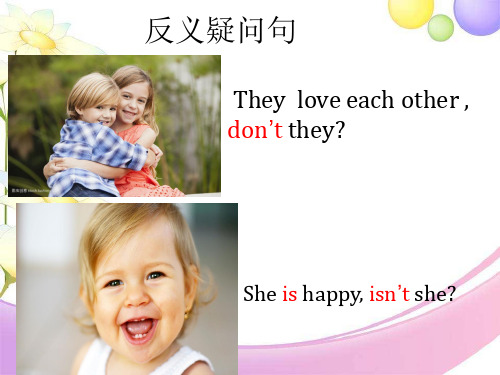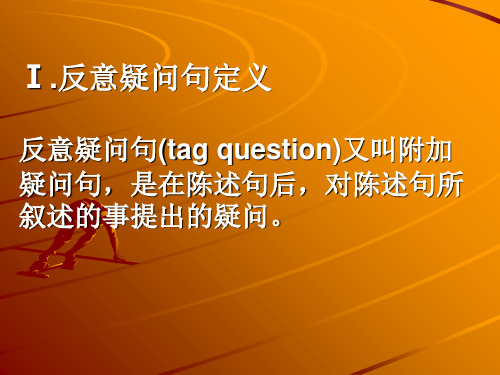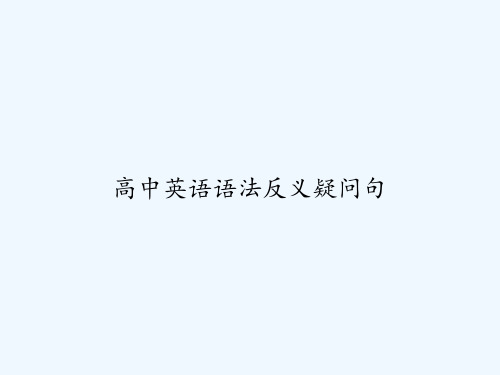高中英语语法反义疑问句 PPT
合集下载
反义疑问句(共14张PPT)

+ You have to believe in yourself. That's the secret of success. 人必须相信自己,这是成功的秘诀。
+
特殊用法2-----There be 句型
陈述部分是“there be”结构时,疑问部分用be there。
There is something wrong with your watch, isn't there?
Summary
一、反义疑问句的结构: 前肯+后否 ;前否+后肯
二、反义疑问句的四种特殊用法 1、祈使句的反义疑问句 2、There be 句型的反义疑问句 3、陈述部分有hardly等词时,提问用肯定形式。 4、反义疑问句的回答(根据事实)
Thanks for listening! Goodbye!
Chinese,_c_a_n___h_e___? 6.Please call me,_w__o_n_’t_y_o_u__?
7.Let’s go home, s_h__a_l_l_w__e__ ?
8.Let us go home,w__i_l_l_y_o__u__?
9.Don’t play on the road,w__i_l_l_y__o_u_?
2、Let‘s 开头的祈使句,后用shall we? 而Let us 开 头的祈使句,后用will you ?
+9、要学生做的事,教职员躬亲共做;要学生学的知识,教职员躬亲共学;要学生守的规则,教职员躬亲共守。2024/3/72024/3/7Thursday, March 07, 2024 +10、阅读一切好书如同和过去最杰出的人谈话。2024/3/72024/3/72024/3/73/7/2024 1:35:33 PM +11、只有让学生不把全部时间都用在学习上,而留下许多自由支配的时间,他才能顺利地学习……(这)是教育过程的逻辑。2024/3/72024/3/72024/3/7Mar-247-Mar-24 +12、要记住,你不仅是教课的教师,也是学生的教育者,生活的导师和道德的引路人。2024/3/72024/3/72024/3/7Thursday, March 07, 2024
+
特殊用法2-----There be 句型
陈述部分是“there be”结构时,疑问部分用be there。
There is something wrong with your watch, isn't there?
Summary
一、反义疑问句的结构: 前肯+后否 ;前否+后肯
二、反义疑问句的四种特殊用法 1、祈使句的反义疑问句 2、There be 句型的反义疑问句 3、陈述部分有hardly等词时,提问用肯定形式。 4、反义疑问句的回答(根据事实)
Thanks for listening! Goodbye!
Chinese,_c_a_n___h_e___? 6.Please call me,_w__o_n_’t_y_o_u__?
7.Let’s go home, s_h__a_l_l_w__e__ ?
8.Let us go home,w__i_l_l_y_o__u__?
9.Don’t play on the road,w__i_l_l_y__o_u_?
2、Let‘s 开头的祈使句,后用shall we? 而Let us 开 头的祈使句,后用will you ?
+9、要学生做的事,教职员躬亲共做;要学生学的知识,教职员躬亲共学;要学生守的规则,教职员躬亲共守。2024/3/72024/3/7Thursday, March 07, 2024 +10、阅读一切好书如同和过去最杰出的人谈话。2024/3/72024/3/72024/3/73/7/2024 1:35:33 PM +11、只有让学生不把全部时间都用在学习上,而留下许多自由支配的时间,他才能顺利地学习……(这)是教育过程的逻辑。2024/3/72024/3/72024/3/7Mar-247-Mar-24 +12、要记住,你不仅是教课的教师,也是学生的教育者,生活的导师和道德的引路人。2024/3/72024/3/72024/3/7Thursday, March 07, 2024
反意疑问句ppt课件

• Jack wasn’t playing soccer, _w__a_s _h_e___? • Their parents have gone to London,
__h_a_v_e_n_’_t t_h_e_y__? • I have never been to the park, __h_a_v_e_n’_t_I__? • You have a good friend, __d_o_n_’t_y_o_u___? • We had a meeting, __d_i_d_n_’t_w_e___?
Grammar: 反意疑问句
一、定义:
当我们陈述了一个事实,而又不是很 有把握,就可以在陈述句后加一个简 短问句,称为反意疑问句。它表示提 问人的看法,没有把握,需要对方证 实。反义疑问句由两部分组成:前一 部分是一个陈述句,后一部分是一个 简短的疑问句,两部分的人称时态应 保持一致。
二、结构:
结构一: 前肯,+ 后否 eg. She is a student, isn’t she?
结构二: 前否,+ 后肯 eg. She isn’t a student, is she?
三、反意疑问句的解答步骤
1. 判定(判断该用肯定还是否定); 2. 找动(找句子的助动词:be用be,动词原形do, 三单does,过去did,完成have); 3. 换代(将主语换为人称代词);
2. 一般动词(play, study, watch 等)句型:
现在 主语+play/plays…, don’t (doesn’t) + 主语? 过去 主语+played…, didn’t + 主语?
1 Your mother likes cooking ,_d__o_e_s_n_’t_s_h_e___? 2 He has an apple, __d_o_e_s_n_’_t _h_e____? 3 The plane took off an hour ago, __d_i_d_n_’t_i_t___? 4 He didn’t go to school late this morning,
反义疑问句讲解ppt课件

1 Don’t be late, w_i_ll__y_ou______? 2 Have a rest, ___w_i_ll _y_o_u___? 3 Speak louder, ___w_il_l _yo_u____? 4 Don’t wait for me, _w_il_l _y_ou____?
let
当为〞let us〞时 当为〞let’s〞时
疑问句为“will you〞 前五后四 疑问句为“shall we “ 前四后五
1.Let’s go to park, Shall we ?
前四
后五
2.Let us do homework. Will you ?
前五
后四
回答
不论一定否认,只抓信息点,能否吻合。照实回答
情态动词
像can/will等情态动词,变为否以为can’t/won’t即可
当have 在完成时中或“You had better〞中时,也当情态动词变。 Have/haven’t,had/hadn’t
1.Lily can play football , Can’t she ? 2.Tom will visit China next mouth , Won’t he ? 3.She has been to HongKong , hasn’t she ? 4.You ‘d better lie down and have a rest ,Hadn’t you ? 5.You can’t go out , Can you ?
反义疑问句
Grammar: 反意疑问句
一、定义:
当我们陈说了一个现实,而又不是很 有把握,就可以在陈说句后加一个简 短问句,称为反意疑问句。
例: 1. She is a student, isn’t she? 2. We speak Chinese, don’t we?
let
当为〞let us〞时 当为〞let’s〞时
疑问句为“will you〞 前五后四 疑问句为“shall we “ 前四后五
1.Let’s go to park, Shall we ?
前四
后五
2.Let us do homework. Will you ?
前五
后四
回答
不论一定否认,只抓信息点,能否吻合。照实回答
情态动词
像can/will等情态动词,变为否以为can’t/won’t即可
当have 在完成时中或“You had better〞中时,也当情态动词变。 Have/haven’t,had/hadn’t
1.Lily can play football , Can’t she ? 2.Tom will visit China next mouth , Won’t he ? 3.She has been to HongKong , hasn’t she ? 4.You ‘d better lie down and have a rest ,Hadn’t you ? 5.You can’t go out , Can you ?
反义疑问句
Grammar: 反意疑问句
一、定义:
当我们陈说了一个现实,而又不是很 有把握,就可以在陈说句后加一个简 短问句,称为反意疑问句。
例: 1. She is a student, isn’t she? 2. We speak Chinese, don’t we?
反义疑问句详细讲解课件(PPT27张)

I don’t believe he has finished his work.
7.当陈述部分的主句是I think (expect, believe)等结构时,反 意疑问句的附加部分则往往与从 句中的主语和谓语动词保持对应 关系,但要注意否定的转移。 例如:
I think he’s funny, isn’t he? I don’t believe she likes my
You must have seen the film last week, didn’t you?
6. 当陈述部分是I am…时,反意疑 问句部分通常要用aren’t I;如陈述 句部分的主语是I am not时,反意疑 问句部分通常要用am I。 例如:
1)I am a teacher, aren’t I?
Ⅰ.反意疑问句定义
反意疑问句(tag question)又叫附加 疑问句,是在陈述句后,对陈述句所 叙述的事提出的疑问。
Ⅱ.基本结构:
陈述句+逗号+简短的一般疑问句?
遵循前肯定后否定前否后肯式的原则
①前肯后否式。例如:
You are all students, aren’t you﹖
②前否后肯式。例如:
Let’s have a rest, shall we? 以let us开头的祈使句,不包括 说话人在内,因此反意疑问句的 附加部分用will you。例如:
Let us stop now, will you?
Ⅳ. 反意疑问句的回答 “ 根据事实回答”
对反意疑问句的回答,无论问题的提法如何,如果 事实是肯定的,就用yes,事实是否定的,就要用no。 要特别注意陈述句部分是否定结构,反意疑问句部分 用肯定式提问时,回答yes或no与汉语正好相反。这 种省略回答的yes要译成“不”,no要译成“是”。
7.当陈述部分的主句是I think (expect, believe)等结构时,反 意疑问句的附加部分则往往与从 句中的主语和谓语动词保持对应 关系,但要注意否定的转移。 例如:
I think he’s funny, isn’t he? I don’t believe she likes my
You must have seen the film last week, didn’t you?
6. 当陈述部分是I am…时,反意疑 问句部分通常要用aren’t I;如陈述 句部分的主语是I am not时,反意疑 问句部分通常要用am I。 例如:
1)I am a teacher, aren’t I?
Ⅰ.反意疑问句定义
反意疑问句(tag question)又叫附加 疑问句,是在陈述句后,对陈述句所 叙述的事提出的疑问。
Ⅱ.基本结构:
陈述句+逗号+简短的一般疑问句?
遵循前肯定后否定前否后肯式的原则
①前肯后否式。例如:
You are all students, aren’t you﹖
②前否后肯式。例如:
Let’s have a rest, shall we? 以let us开头的祈使句,不包括 说话人在内,因此反意疑问句的 附加部分用will you。例如:
Let us stop now, will you?
Ⅳ. 反意疑问句的回答 “ 根据事实回答”
对反意疑问句的回答,无论问题的提法如何,如果 事实是肯定的,就用yes,事实是否定的,就要用no。 要特别注意陈述句部分是否定结构,反意疑问句部分 用肯定式提问时,回答yes或no与汉语正好相反。这 种省略回答的yes要译成“不”,no要译成“是”。
完整反义疑问句课件

04
反义疑问句的回答
肯定回答
要点一
肯定回答时,通常使用“Yes”来 回答反义疑问句,并重复…
You like apples, don’t you? 回答:Yes, I do.
要点二
如果对反义疑问句中的否定部分 进行强调,可以使用“Yes…
You didn’t go to the party, did you? 回答:Yes, I did.
详细描述
反义疑问句是一种常见的语法结构,通常用于表达说话者的 态度、观点或对某件事情的疑问。它的特点是前半部分是一 个肯定或否定的陈述句,而后半部分则通过疑问的形式表达 相反的意思。
类型
总结词
反义疑问句可以分为两种类型,即标准反义疑问句和非标准反义疑问句。
详细描述
标准反义疑问句的前半部分是一个肯定句,后半部分是一个否定疑问句;或者 前半部分是一个否定句,后半部分是一个肯定疑问句。而非标准反义疑问句则 不遵循这一规则,前后两部分没有明显的相反意思。
总结词
表示某些特殊情况或特殊用法,需要特 别注意。
VS
详细描述
在某些特殊情况下,反义疑问句的用法可 能会发生变化。例如,当陈述句为祈使句 时,反义疑问句通常会省略主语;当陈述 句为感叹句时,反义疑问句通常会省略疑 问词。此外,还有一些特殊的反义疑问句 结构,如“他不是学生吗?”等,需要特 别注意其用法和含义。
否定回答
要点一
否定回答时,可以使用“No”来 回答反义疑问句,并重复疑…
You don’t like coffee, do you? 回答:No, I don’t.
要点二
如果对反义疑问句中的肯定部分 进行强调,可以使用“No,…
You went to the concert, didn’t you? 回答:No, I didn’t.
反义疑问句详细讲解课件(PPT27张)

2) have to表示“不得不,必须”之意 时,附加问句的谓语应用助动词do.
Kate has to help her mother at home,doesn’t she?
3) have表示“吃,喝,玩,度过”等意 思时,其附加问句的谓语应用助动词do.
They had a good time in Beijing ,didn’t they?
Ⅰ.反意疑问句定义
反意疑问句(tag question)又叫附加 疑问句,是在陈述句后,对陈述句所 叙述的事提出的疑问。
Ⅱ.基本结构:
陈述句+逗号+简短的一般疑问句?
遵循前肯定后否定前否后肯式的原则
①前肯后否式。例如:
You are all students, aren’t you﹖
②前否后肯式。例如:
[误] Tom can speak Chinese well, can’t Tom﹖
[正] Tom can speak Chinese well, can’t he﹖
一般现在时:
Lily likes going shopping, d_o_e_s_n__’t_she? They aren’t students, __a_r_e___
You must have seen the film last week, didn’t you?
6. 当陈述部分是I am…时,反意疑 问句部分通常要用aren’t I;如陈述 句部分的主语是I am not时,反意疑 问句部分通常要用am I。 例如:
1)I am a teacher, aren’t I?
The End
They must come on time,needn’t they?
2)must表示推测,“一定,想必”之意,附加问 句的谓语动词的确定应根据must后面的动词。
Kate has to help her mother at home,doesn’t she?
3) have表示“吃,喝,玩,度过”等意 思时,其附加问句的谓语应用助动词do.
They had a good time in Beijing ,didn’t they?
Ⅰ.反意疑问句定义
反意疑问句(tag question)又叫附加 疑问句,是在陈述句后,对陈述句所 叙述的事提出的疑问。
Ⅱ.基本结构:
陈述句+逗号+简短的一般疑问句?
遵循前肯定后否定前否后肯式的原则
①前肯后否式。例如:
You are all students, aren’t you﹖
②前否后肯式。例如:
[误] Tom can speak Chinese well, can’t Tom﹖
[正] Tom can speak Chinese well, can’t he﹖
一般现在时:
Lily likes going shopping, d_o_e_s_n__’t_she? They aren’t students, __a_r_e___
You must have seen the film last week, didn’t you?
6. 当陈述部分是I am…时,反意疑 问句部分通常要用aren’t I;如陈述 句部分的主语是I am not时,反意疑 问句部分通常要用am I。 例如:
1)I am a teacher, aren’t I?
The End
They must come on time,needn’t they?
2)must表示推测,“一定,想必”之意,附加问 句的谓语动词的确定应根据must后面的动词。
高中英语语法反义疑问句-PPT

3)含有ought to 的反意疑问句, 陈述部分是肯定的,疑问部分 用oughtn't +主语。
He ought to know what to do, oughtn't he?
大家有疑问的,可以询问和交流
可以互相讨论下,
4)陈述部分有 have to + v. (had to + v.),疑问部分常用don't + 主语(didn't +主语)。
2.陈述部分为否定式 + 疑问部 分就为肯定式
You didn’t go, did you?
He can’t ride a bike, can he?
请注意以下句型的反义疑 问句:
1)陈述部分的主语是I,疑问部 分要用 aren't I.
I’m as tall as your sister, aren't I?
14)前有情态动词dare或need, 疑问部分用 need (dare ) +主语。
We need not do it again, need we ? He dare not say so, dare you?
当dare, need 为实义动词时, 疑问部分用助动词 do + 主语。
She doesn't dare to go home alone, does she?
I am a student, aren’t I?
2)陈述部分用 no, nothing, nobody, never, few, seldom, hardly, rarely, little等否定含义 的词时,疑问部分用肯定含义。
The Swede made no answer, did he / she? Some plants never blown (开花), do they ?
反意疑问句ppt课件

1.找出错误并改正 1)Tom is a worker, isn’t Tom? isn’t he ?
2)You can swim, can not you? can’t you ?
3)He had lunch, doesn’t he? didn’t he ?
二.单选
1.Mr Green went to Shenzhen last week, C ?
17. Let’s go to the cinema , will you?
18. Let us go out for a walk ,
?
19. I don’t think she will come here ,will she
?
20. I think it rained last night , didn’t it ?
2.He can hardly swim, can he ?
3.There is little water in the glass, is there ?
注意:当陈述句中有带否定前缀(un-,dis-,im-)或否定
后缀(-l e s s ) 的单词时,整个句子仍视为肯定句,反意部 分用否定形式。
they/he
Everyone is here, aren’t they/isn’t he?
4.everything anything
it
something nothing
Something is in that bottle, isn’t it?
注意1:祈使句的反意疑问句, 一律用 will you ?
1. I am on duty, aren’t I ?
2. Your mother is a doctor , isn’t she ?
2)You can swim, can not you? can’t you ?
3)He had lunch, doesn’t he? didn’t he ?
二.单选
1.Mr Green went to Shenzhen last week, C ?
17. Let’s go to the cinema , will you?
18. Let us go out for a walk ,
?
19. I don’t think she will come here ,will she
?
20. I think it rained last night , didn’t it ?
2.He can hardly swim, can he ?
3.There is little water in the glass, is there ?
注意:当陈述句中有带否定前缀(un-,dis-,im-)或否定
后缀(-l e s s ) 的单词时,整个句子仍视为肯定句,反意部 分用否定形式。
they/he
Everyone is here, aren’t they/isn’t he?
4.everything anything
it
something nothing
Something is in that bottle, isn’t it?
注意1:祈使句的反意疑问句, 一律用 will you ?
1. I am on duty, aren’t I ?
2. Your mother is a doctor , isn’t she ?
- 1、下载文档前请自行甄别文档内容的完整性,平台不提供额外的编辑、内容补充、找答案等附加服务。
- 2、"仅部分预览"的文档,不可在线预览部分如存在完整性等问题,可反馈申请退款(可完整预览的文档不适用该条件!)。
- 3、如文档侵犯您的权益,请联系客服反馈,我们会尽快为您处理(人工客服工作时间:9:00-18:30)。
10)陈述部分主语是指示代词或 不定代词 everything, that, this nothing等时, 疑问部分主语用 it 。
Everything is ready, isn't it?
11)带有定语从句,宾语从句 等的主从复合句,疑问部分谓语 根据主句的谓语而定:
He is not the man who gave us a talk, is he? He said he wanted to visit Japan, didn't he?
Let's go and listen to the music, shall we? Let us wait for you in the reading-room, will you ?
He would rather read it ten times than recite it, wouldn't he?
8)陈述部分有You'd like to + v. 疑问部分用wouldn't +主语。
You’d like to go with me, wouldn't you?
9)must表示“推测”时,如何确 定反意疑问句? He must be a doctor, isn't he? He must like physics, doesn't he? You must have studied English, haven't you? He must have finished it yesterday, didn't he?
3)含有ought to 的反意疑问句, 陈述部分是肯定的,疑问部分 用oughtn't +主语。
He ought to know what to do, oughtn't he?
大家有疑问的,可以询问和交流
可以互相讨论下,
4)陈述部分有 have to + v. (had to + v.),疑问部分常用don't + 主语(m a student, aren’t I?
2)陈述部分用 no, nothing, nobody, never, few, seldom, hardly, rarely, little等否定含义 的词时,疑问部分用肯定含义。
The Swede made no answer, did he / she? Some plants never blown (开花), do they ?
12)I /we think(believe, expect, suppose, imagine,guess)后加宾语从句时,反义疑 问部分与宾语从句相一致。
I think he is bright, isn’t he? We believe she can do it better, can't she? I don't think he is bright, is he? She thinks he is bright, doesn’t she? She doesn’t think he is bright, does she?
We have to get there at eight tomorrow, don't we?
They had to cross the busy street, didn’t they?
5)陈述部分的谓语是used to 时, 疑问部分用didn't +主语或 usedn't +主语。
He used to take pictures there, didn't he?
13) 陈述部分主语是不定代词 everybody, anyone, somebody, nobody, no one等,疑问部分常 用复数they,有时也用单数he。
Everyone knows the answer, don't they? (does he?) Nobody knows about it, do they? (does he?)
2.陈述部分为否定式 + 疑问部 分就为肯定式
You didn’t go, did you?
He can’t ride a bike, can he?
请注意以下句型的反义疑 问句:
1)陈述部分的主语是I,疑问部 分要用 aren't I.
I’m as tall as your sister, aren't I?
14)前有情态动词dare或need, 疑问部分用 need (dare ) +主语。
We need not do it again, need we ? He dare not say so, dare you?
当dare, need 为实义动词时, 疑问部分用助动词 do + 主语。
She doesn't dare to go home alone, does she?
She used to stay up late, usedn’t she?
6)陈述部分有had better + v. 疑 问句部分用hadn't you?
You'd better read it by yourself, hadn't you?
7)陈述部分有would rather + v. 疑问部分用 wouldn't +主语。
高中英语语法反义疑问句
反义疑问句
又叫附加疑问句。反义疑问句由 两部分组成:前一部分是一个陈 述句,后一部分是一个简短的疑 问句,两部分的人称时态应保持 一致。
1.陈述部分为肯定式 + 疑问部 分就为否定式
They work here, don’t they?
She was ill yesterday, wasn’t she?
15)祈使句的反意疑问句,疑问 部分用will you/won’t you。 Don't do that again, will you?
Go with me, will you / won't you ?
注意:Let's 开头的祈使句,后 用shall we?
Let us 开头的祈使句,后 用will you?
